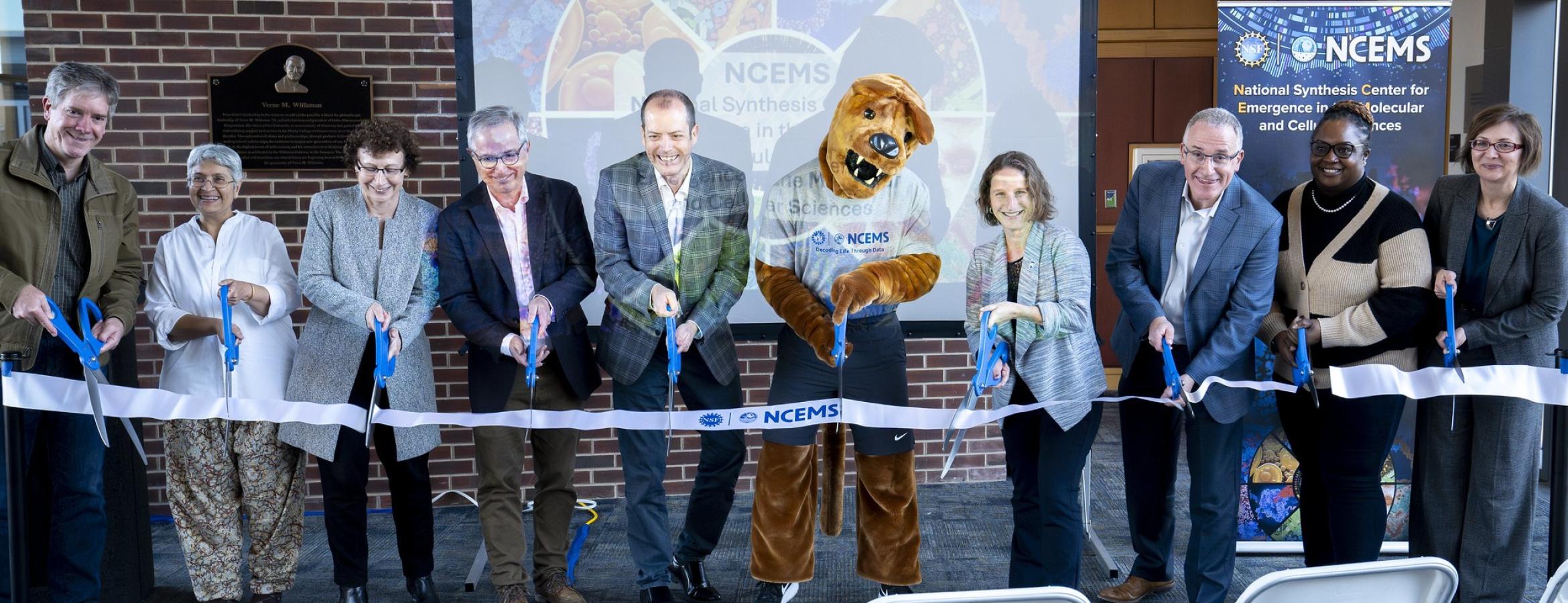
Penn State and the U.S. National Science Foundation (NSF) celebrated the official launch of the U.S. National Science Foundation National Synthesis Center for Emergence in the Molecular and Cellular Sciences (NCEMS) with a ribbon cutting and ceremony at the Verne M. Willaman Gateway to the Life Sciences bridge in the Huck Institutes of the Life Sciences on Nov. 18. The event marked the physical dedication of the federally funded center, which was first announced in April.
The ceremony brought together faculty and students to learn more about NCEMS’ mission and vision for growth over the next five years.
"NCEMS is bringing a powerhouse of computational and data sciences, particularly at the molecular and cellular level,” said Andrew Read, senior vice president for research, in his remarks at the NCEMS launch event. “We are looking forward to the success of NCEMS and believe there are significant opportunities for driving formative discoveries in this space."
The center will enable research that uses existing, publicly available data to glean new insights about how complex biological systems, such as cells, emerge from simpler molecules. Findings from the research could eventually inform the development of disease treatments and other applications such as minimizing the negative effects of aging.
The center aims to create a community of scientists to support research using molecular and cellular data to answer fundamental questions, gain new understandings of “emergent” properties which refer to characteristics that arise from the interactions between biological components, and to make new discoveries. Through this mission, NCEMS will create working groups, develop and test novel methodologies, and provide learning opportunities and workforce training.

"We at NCEMS have the opportunity to take a step back and to take a look at and integrate under-utilized, publicly available data in novel ways," said Ed O’Brien, NCEMS director, professor of chemistry in the Eberly College of Science and Penn State Institute for Computational and Data Sciences (ICDS) co-hire. "NCEMS will work to lower barriers in community-scale research by bringing scientists together to create a community to drive discovery of emergent properties. We are on a growth trajectory that will include more open calls for scientists, postdocs and undergraduates to carry out research on these datasets, as well as to train the next generation in data science and team science."
Currently, NCEMS has several open calls for scientists around the world at different stages of their careers to join working groups or to become a postdoctoral fellow or an undergraduate summer intern.
NCEMS will initially support six working groups, the applications for which have a submission deadline of Jan. 15. Working groups will tackle scientific research questions by using existing molecular and cellular data, with comprehensive support that includes dedicated time and guidance from the center’s staff scientists and staff scientist assistants, access to cyberinfrastructure through the University of Arizona's CyVerse, assistance with publication costs, a travel budget for in-person meetings and personnel exchanges, and cross-disciplinary trainings in open and team science.
A summer internship program will offer undergraduate students the opportunity to work on a project in a professional research setting, serving as a pathway to graduate education, according to NCEMS. The submission deadline is Feb. 10.
Additionally, NCEMS will offer three-year fellowships to postdocs that will build the fellows’ skills by providing opportunities for professional development, research resources, community engagement and research excellence. The submission deadline is March 9.
"We are thrilled with the vision of NCEMS and the support across Penn State for this center,” said Manju Hingorani, program director of molecular and cellular biosciences at the NSF, at the launch event. “NCEMS will benefit society in ways we have yet to imagine and empower the next generation students to realize this vision."
NCEMS is also supported by the Huck Institutes and ICDS.
Featured quotes from the NCEMS dedication event:

“NCEMS is combining the theories from the physical sciences with statistical methodologies needed to detect signals from the noise in big data to solve problems in molecular and cellular biology and to answer some of the most compelling questions of how life processes arise. It is only natural to have faculty from the Eberly College of Science as part of the NCEMS leadership team. NCEMS will synergize scientists across Penn State, the country and world through innovative research and outreach initiatives.” — Aleksandra Slavkovic, associate dean for research and professor of statistics, Eberly College of Science; Dorothy Foehr Huck and J. Loyd Huck Chair in Data Privacy and Confidentiality
